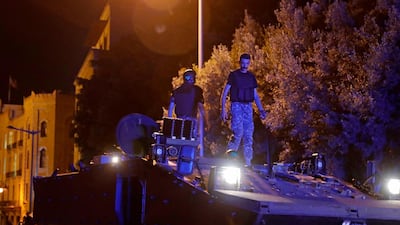Lebanese police used teargas to try to disperse rock-throwing protesters blocking a road near parliament in Beirut on Sunday in the second day of anti-government demonstrations triggered by last week's devastating explosion.
A fire broke out at an entrance to the square outside Parliament as demonstrators tried to break into a cordoned-off area, TV footage showed. Protesters also broke into the offices of the ministries of housing and transport.
Two government ministers resigned on Sunday amid the political fallout of the blast and months of economic crisis, saying the government had failed to reform.
Tuesday's explosion of more than 2,000 tonnes of ammonium nitrate killed 158 people and injured more than 6,000, compounding months of political and economic collapse and prompting furious calls for the government to quit.
Riot police wearing body armour and carrying batons clashed with demonstrators as thousands converged near Parliament and Martyrs' Square.
"We gave these leaders so many chances to help us and they always failed. We want them all out, especially Hezbollah, because it's a militia and just intimidates people with its weapons," Walid Jamal, an unemployed demonstrator, said, referring to the country's most influential Iran-backed armed group that has ministers in the government.
The country's top Christian Maronite cleric, Patriarch Bechara Boutros Rai, said the cabinet should resign as it cannot "change the way it governs".
"The resignation of an MP or a minister is not enough. The whole government should resign as it is unable to help the country recover," he said in his Sunday sermon.
Lebanon's environment minister resigned on Sunday, saying the government had lost a number of opportunities to reform.
Damianos Kattar's departure follows the resignation of Information Minister Manal Abdel Samad earlier on Sunday after the explosion.
Mr Kattar is an academic who is close to Prime Minister Hassan Diab. He was briefly Lebanon’s prime minister in a short-lived government in 2005.
Ms Abdel Samad said on live television that she has resigned "in response to the popular will for change", and that she "bows in front of the spirit of those killed in the explosion".
"I apologise to the Lebanese because we were unable to meet their aspirations. Change remained elusive, and since reality did not match the ambitions, and after the horror of the Beirut disaster, I submit my resignation from the government," Lebanon's National News Agency quoted her as saying.
For the thousands gathered in Beirut's Martyrs Square, more resignations were needed.
"The police fired at me. But that won't stop us from demonstrating until we change the government from top to bottom," Younis Flayti, 55, a retired army officer, said on Sunday.
Nearby, mechanic Sabir Jamali sat beside a noose attached to a wooden frame in Martyrs' Square, intended as a symbolic warning to Lebanese leaders to resign or face hanging.
"Every leader who oppresses us should be hanged," he said, adding he will protest again.
Lawyer Maya Habli surveyed the demolished port.
"People should sleep in the streets and demonstrate against the government until it falls," she said.
The prime minister and presidency have said 2,750 tonnes of highly explosive ammonium nitrate, which is used in making fertilisers and bombs, had been stored for six years without safety measures at the port warehouse.
The government has said it will hold those responsible to account.
An emergency donor conference in France raised pledges worth nearly $298 million for immediate humanitarian relief, the French presidency said.
For many, the blast was a dreadful reminder of the 1975-1990 civil war that tore the nation apart and destroyed large parts of Beirut, much of which has since been rebuilt.
"I worked in Kuwait for 15 years in sanitation to save money and build a gift shop in Lebanon and it was destroyed by the explosion," said Maroun Shehadi.
"Nothing will change until our leaders just leave."














